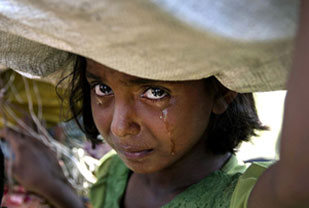Education Opens The Doors Of Freedom, Yet Again
Humanitarian Responses


Life has been different since the pandemic rolled over our lives. It had a huge impact on the vulnerable counterparts of our society, especially women & young girls. We have seen a horrifying dropout rate & low attendance amongst girls as they are required to assist their families with household responsibilities and to care for their younger siblings. The major factors that contribute to the females’ dropout rate is their lower socioeconomic status and big transition to (rather not to) digital learning that has a significant impact on the youngsters.
Let’s take for instance, Devarajeevanahalli or DJ Halli, one of Bangalore’s largest government-notified slums. Many struggle to access even the most basic digital devices to continue their e-learning. Only a few lucky students are able to attend lessons since they only have one smartphone and restricted internet data connection; girls may not be as fortunate as boys in terms of digital access. This also serves as a reminder to close the gender gap in access to technology-based education.
Schools in India are now almost completely reopened, but a UNICEF India report suggests that due to schools closing or shifting to online mode of education for the past two years the dropout rate of the girl child has increased.
To motivate girls from the marginalised community of Roshan Nagar & get them back to the school, we collaborated with Modern Public School, an under-resourced institution where children from low-income families study. This community school is constantly striving to provide its students with better exposure and to support them in their intervention. We designed a programme and worked closely with the school management to engage with the adolescent girls of grade 8. We used the transformative power of story-telling and visual arts to help adolescent girls to develop creativity, confidence & life skills such as communication, critical thinking, and empathy. In the span of 2 hours, the group engaged in activities like poster making on themes such as menstrual hygiene, COVID-19, and anaemia.
We also conducted a storytelling activity focussing on girl child education. The girls came up with stories based on solutions to the socially constructed problems in attaining education along with the heart-warming posters and suggested commendable solutions for their problems.
Through these activities we were able to provide them with cues & prompts which were intellectually stimulating and helped them share their thoughts. It was a child friendly way to make these young minds reflect, learn & understand various social issues and become advocates for their peers & their community.
“Education is key to unlocking the door of freedom,” a girl from the group said. She shared she wanted to do much more and she wanted to be a doctor. The conversations picked up when some of them raised concerns of the social constructs which bind them from being a free human being with an independent will. Mostly, young school going girls from these communities are encouraged to handle household chores due to established gender norms and are expected to undertake gender-based tasks rather than standing up against conventional ideas.
Obtaining an education has always been a struggle for women, and it became even more difficult during the pandemic. There is a need to inspire, guide and handhold young girls to pull them out of that conditioning and make them realize their true potentials.
Like the American actor and singer Cher said, “Women are the real architects of society” but only if they feel empowered & feel confident from within.
📢Oxfam India is now on Telegram. Click here to join our Telegram channel and stay tuned to the latest updates and insights on social and development issues. 
Check you latest news


